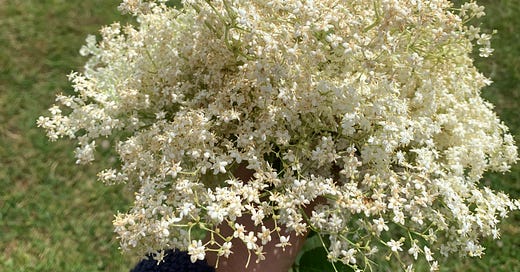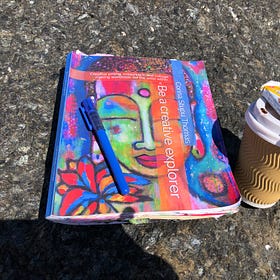When the Elderflowers Speak: A Rewilding of Memory, Hands, and Heart
On foraging, forgotten wisdom, and why self-sufficiency is our quiet revolution
The Quiet Bloom of Elderflowers
It’s the beginning of June, and the elderflowers are in full bloom here in my part of the world. These delicate, hat-shaped blossoms are easy to spot and a joy to gather on a leisurely walk. Their gentle fragrance and graceful form remind me that beauty often grows quietly, right under our noses.
I truly love and wholeheartedly recommend foraging to anyone yearning to reconnect with nature, people recovering from abuse, narcissistic relationships, bullying, burnout or just as a prevention method as well. It’s a beautiful, grounding act that pulls us away from the glowing traps of smartphones, endless scrolling, and the false urgency of games—things that often keep our minds occupied but not fulfilled. Foraging gently calls us back to presence, to what actually matters.
When Nature Becomes a Lifestyle Brand and a Rooster Called Vasile
Modern Western life has pushed us so far from what is real and nourishing, only to then repackage and sell it back to us as a lifestyle upgrade. Don’t believe me? Just think about this: in order to encourage people to spend time in nature, someone had to invent and brand the concept of "forest bathing." Forest bathing! Really? Do we now need a manual or a coach to teach us how to walk among trees and listen to birds? If that sounds absurd—it’s because it is. And yet, this is how successful the societal programming has been.
Take something as simple as chickens. So many people today have no idea what a chicken's natural habitat even looks like. I was lucky. I grew up watching them roam freely, pecking at grains, enjoying a muddy bath, and proudly following their leader—Vasile, the top rooster (he will come back in my future blogs). It never occurred to me that one day I’d meet people who have never been near chickens, geese, or turkeys in a home setting. There’s something powerful and truthful in those early bonds formed with animals. When we grow up understanding who they are, we begin to understand more deeply who we are.
The Wisdom of Grandmothers
My grandmothers were deeply connected to the natural cycle of life. They didn’t need books, apps, or experts to tell them how to live. They simply knew—instinctively, intuitively—what felt right and what didn’t. No one had to teach them what to eat or when to sleep, how many steps to take, how much water to drink, or how many fruits and vegetables to consume. They were attuned to themselves and to the rhythm of the land. Their connection to life was full—silent, alive, and woven with the invisible threads of their ancestors.
No, I won’t romanticize it. Their lives were not always easy or blissful. But we’re not speaking of comfort here—we’re speaking of the essentials, the things that keep both body and soul alive. The knowledge that roots you, sustains you, and helps you endure.
Faith in the Rain
When it came to faith, my grandmother had the simplest, most profound kind of worship. God was real to her—not in sermons or doctrine, but in the animals that lived around her, the crops she nurtured, the fruit trees she harvested. She knew she was the custodian of a small patch of earth, and she cared for it with quiet reverence. When it rained, it rained. When it snowed, it snowed. No fuss, no complaint. Some might call that a defeatist attitude—but I call it wisdom. A deep acceptance of what is.
She had no idea what pharmaceutical products were. Healing came from the plants that grew around her and the wisdom passed down from mother to daughter. The village held a shared knowledge—a legacy of care and survival that modern life has largely forgotten.
When the Lineage Speaks
I strongly believe that our roots are speaking—and sometimes screaming—in our veins. Yes, they are.
We often find ourselves wondering: why this sudden passion for painting, when no one in living memory has ever held a brush? Or why an unexpected urge to forage, to make jams and chutneys, to pickle vegetables, to preserve food, or to create healing potions and natural cosmetics? And no it is not because we are bored or have nothing better to do or have no life. It is because our ancestors live with us and want to be acknowledged in those simple gestures. Why, out of nowhere, the desire to play an instrument, or the deep, almost aching pull toward a faraway place that feels like home, even if we’ve never been there before? Why do certain places unsettle us, or certain names resonate—or repel—with inexplicable force?
This Isn’t Discovery—It’s Remembering
The answer is simple: our lineage is speaking. Our roots, our ancestors—they live on in us. The blood that runs through our veins carries memory. The lineage is alive.
You may one day discover that your grandmother, your great-grandmother, an uncle or aunt, shared your hidden passion. Or perhaps something happened in your ancestral line—a wound, a joy, a trauma—that left a trace. Sometimes our reactions, preferences, or deep aversions are not random at all. They are echoes. Imprints. Unfinished stories.
Maybe that’s why I found my love for foraging. Or perhaps it wasn’t a discovery at all—but a remembering. A reawakening. My cells knew. My soul knew. They always did. Plants matter. They hold wisdom. And I was meant to listen and share their voice with you.
We Are Not Made for Plastic Living
Why? Because, dear reader, it is time to remember who we truly are.
We are not robotic creatures, programmed by modern life to function and consume. We are not the pitiful beings who need experts to teach us how to eat, sleep, walk, or breathe. We are not the infantilized masses who need instructions to tie our shoelaces or apps to tell us when to drink water. We are not the gullible ones buying endless junk out of boredom or blind obedience. We are not the numbed minds lining up for whatever the system approves next, hoping it will buy us acceptance. We are not the followers of plastic people pretending to live perfect plastic lives.
We need to wake up from this manufactured mirage we’re caught in and see the truth: what we've come to accept as normal is anything but natural.
Is it a matrix?
It sure feels like one.
Back to the Elderflowers
But I digressed—let’s go back to the elderflowers, the gifts of nature, and why it is a pleasure to forage for them.
Back in Romania, we used to make something called Socată—non-alcoholic elderflower champagne. A delicious drink we all looked forward to every summer. I remember gypsies bringing the flowers to the market early in the morning, and my mother buying 20 heads at a time. She’d make Socată in a huge 10-litre glass jar. That was the main event.
Still, I like to dry a few heads too and blend them into one of my tea combinations.
Does it take long to make Socată? Not at all. You only need 10 minutes to add all the ingredients to a jar or pot, and then stir it daily for 4–5 days.
Strenuous? Not in the slightest.
And yet—people ask:
"But what’s it good for?"
That always makes me want to laugh. For heaven’s sake, when you're drinking gallons of Coca-Cola, do you ask yourself, what is this good for?
It’s good because you make something yourself.
You don’t spend money.
You use what nature gives.
You enjoy a natural drink.
And yes—you “hydrate” (if we must use another pompous buzzword).
No Nonsense, Please
Honestly, why do we suddenly need such pompous language for the simplest, most natural things? Have you ever asked yourself that?
I think trauma survivors often develop a special sense.
They smell bullshit from a mile away.
They sense when things aren’t right.
They question, they challenge.
They develop a very practical, no-nonsense way of seeing life.
I wonder—what do you think?
If you’ve read this far, I invite you to do something today with your own two hands.
Make something. Anything. A simple herbal tea. A jar of Socată. A walk into nature to gather what blooms. It doesn’t have to be perfect. It just has to be yours.
Self-sufficiency is not about prepping for doomsday—it’s about learning to trust yourself again.
It’s about remembering that you can create, nourish, heal, and care for your life in ways no system or algorithm ever could.
The world is unpredictable. But when you know how to make something from almost nothing—when your hands remember and your heart listens—you’re never truly powerless.
So go ahead. Begin small. Begin today and share if you feel so inclined.
🍋 Simple Socată (Elderflower Lemonade) Recipe
You’ll need:
8–10 large elderflower heads (shake gently to remove bugs, do not wash)
250g sugar (you can adjust this to taste)
1–2 lemons (sliced)
4–5 litres of cold water
A large jar or a clean pot
Optional: a few raisins (helps with fermentation)
Instructions:
Place the elderflowers in a large glass jar or pot.
Add the sugar, lemon slices, and optional raisins.
Pour the cold water over the top.
Stir everything well, cover the jar with a breathable cloth (like muslin), and leave at room temperature.
Stir once daily for 4–5 days. Taste after day 3 to check the flavour.
Once it’s slightly fizzy and tangy, strain into bottles and keep in the fridge.
Consume within a week or two. Best served chilled!
Until next time, be well!
💖 Ways to Support My Work & Mission
📬 Subscribe to my newsletter:
Soul to Soul Stories – creative reflections and healing inspiration straight to your inbox.
🖼️ Buy my artwork:
Fine Art America | Redbubble
📚 Explore my journals & workbooks:
Available on Amazon
🎁 Buy Me a Coffee – plus explore downloadable digital tools & coaching options:
Support here
🎨 Learn how to create simple banners in Canva:
Free tutorial
📺 Subscribe to my YouTube:
Straight talk
🌀 Work with me – Trauma Recovery & Confidence Coaching:
Explore the Straight Talk™ 1:1 Coaching Journey or read more About Me.
💌 Share this newsletter with someone who needs hope, healing, or a reminder of their creative power.






I felt your beautiful heart in your words, Karina. 🙏
My dear Soul Daughter,
You wrote this beautifully. I remembered my grandmother feeding the chicken, the domestic rabbits and the pig. She milked the goat called Ibolya. She brought the body-warm goat milk to the kitchen, poured it into our mugs, and we started our heavenly breakfast. The bread was hot out of the oven. Was it in the countryside? No! In the suburb of Budapest, one kilometer from where I sit now. Well, today you can’t raise pigs or goats in the capital city, and buy everything in Tesco, but Instead of being four years old I am 81. But the mood of your writing brought me back to my happy childhood, Thank you!